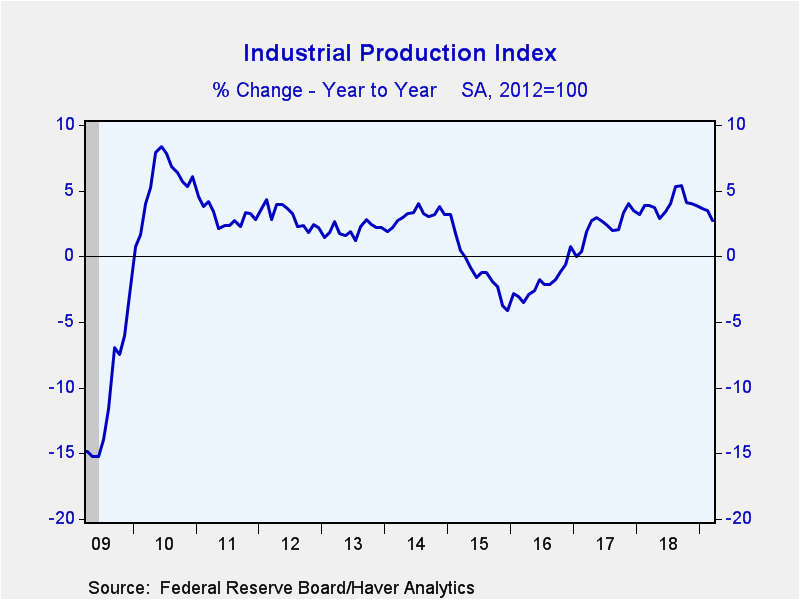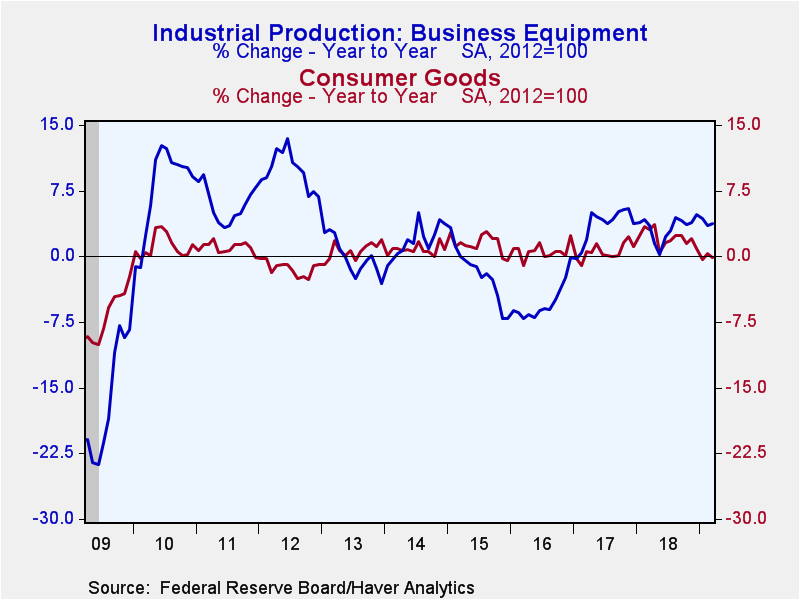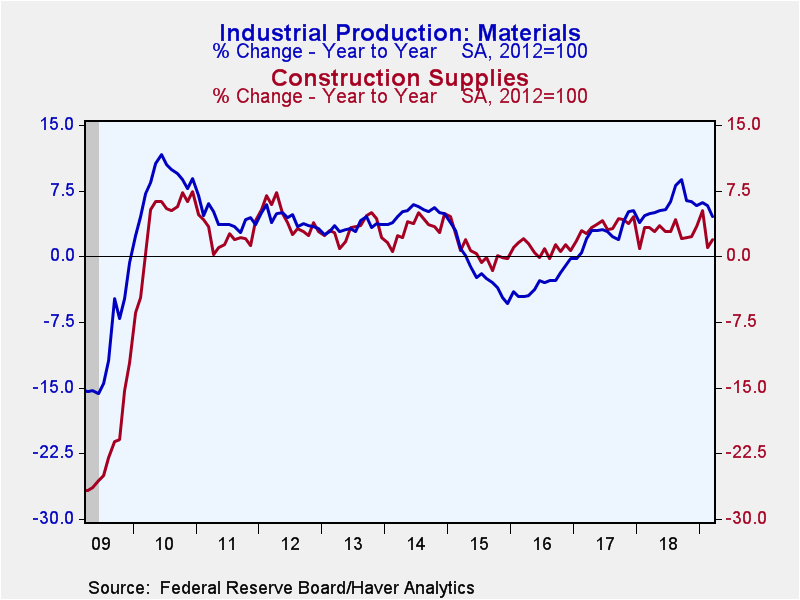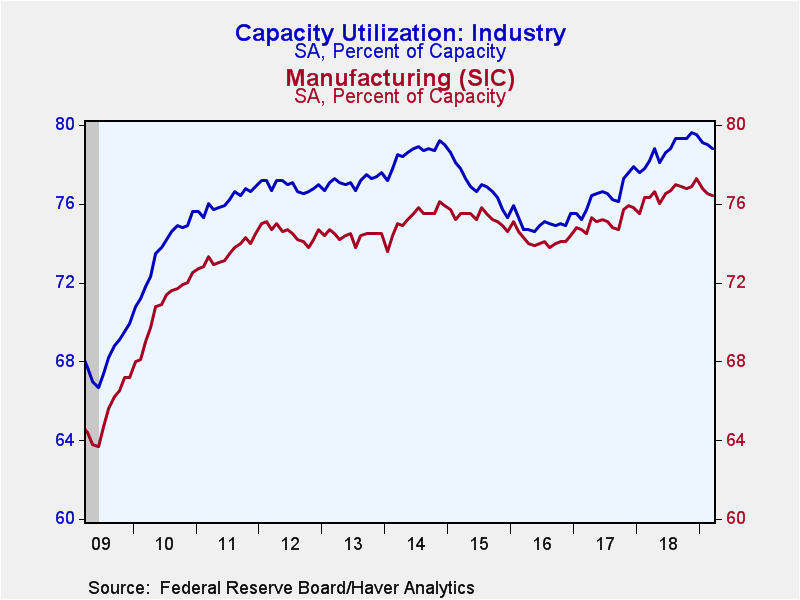 Global| Apr 16 2019
Global| Apr 16 2019U.S. Industrial Production Slips
by:Tom Moeller
|in:Economy in Brief
Summary
Industrial production eased 0.1% as expected (+2.8% y/y) during March after a 0.1% February improvement. Factory output held steady (1.0% y/y) following two straight months of modest decline. Data back through 2017 were revised. [...]
Industrial production eased 0.1% as expected (+2.8% y/y) during March after a 0.1% February improvement. Factory output held steady (1.0% y/y) following two straight months of modest decline. Data back through 2017 were revised.
Output weakness last month was led by a 0.2% decline in consumer goods production which followed a 0.6% rise in February. Durable consumer goods production fell sharply. The 1.8% decline (-2.1% y/y) was led by a 2.3% drop (-3.6% y/y) in production of automotive products. Working lower by 1.4% (11.0% y/y) was production of computers, video & audio products. Appliance, furniture & carpeting production fell 1.4% (-3.4% y/y). Output of nondurable goods rose 0.3% (+0.4% y/y) as food & tobacco production eased 0.1% (-0.6% y/y). Clothing production improved 0.2% (-14.4% y/y). Chemical product output increased 0.9% (1.6% y/y) and paper product production gained 0.3% (-7.4% y/y). Energy product output rose 0.5% (2.8% y/y). Production of business equipment rose 0.4% (3.7% y/y as computer output strengthened 1.5% (6.2% y/y). Industrial equipment output gained 0.3% (3.8% y/y), but production of transit equipment offset these gains with a 0.3% decline (+1.7% y/y). Information processing production increased 1.5% (6.2% y/y). Non-industrial supplies production improved 0.1% (+0.7% y/y) after declining 0.4%.
Materials production eased 0.3% (+4.5% y/y) as consumer parts production fell 1.8% (-5.7% y/y). Equipment parts offset this decline with a 0.8% rise (6.1% y/y). Textile materials production improved 0.8% (7.2% y/y).
Selected high-tech product output gained 0.2% (3.5% y/y) as semiconductor production rose 0.4% (4.6% y/y). Computer & office equipment production was unchanged (-3.7% y/y) and communication equipment output eased 0.1% (+10.0% y/y). Manufacturing production excluding high-tech and the motor vehicle industry rose 0.2% (1.5% y/y).
Overall capacity utilization eased to 78.8% from an upwardly revised 79.0%. A rate of 79.2% had been expected. Factory sector utilization edged lower to 76.4% from 76.5%. Utilization in the mining sector was 90.9% and 79.9% in the utility sector. Manufacturing sector capacity rose 0.9% y/y following a 0.4% rise in 2018 and two years of 0.7% growth.
Industrial production and capacity utilization data are included in Haver's USECON database. Additional detail on production and capacity can be found in the IP database. The expectations figures come from the AS1REPNA database.
| Industrial Production (SA, % Change) | Mar | Feb | Jan | Mar Y/Y | 2018 | 2017 | 2016 |
|---|---|---|---|---|---|---|---|
| Total Output | -0.1 | 0.1 | -0.3 | 2.8 | 3.9 | 2.3 | -2.0 |
| Manufacturing | 0.0 | -0.3 | -0.5 | 1.0 | 2.3 | 2.0 | -0.8 |
| Consumer Goods | -0.2 | 0.6 | -1.2 | 0.1 | 2.1 | 0.5 | 0.6 |
| Business Equipment | 0.4 | -0.8 | 0.1 | 3.7 | 3.3 | 3.6 | -5.3 |
| Construction Supplies | 0.4 | -1.4 | 0.0 | 1.4 | 2.8 | 3.4 | 0.9 |
| Materials | -0.3 | 0.1 | -0.2 | 4.5 | 5.9 | 2.7 | -3.0 |
| Utilities | 0.2 | 3.7 | 0.6 | 4.1 | 4.4 | -0.8 | -0.4 |
| Mining | -0.8 | 0.0 | -0.2 | 10.5 | 12.4 | 7.4 | -10.0 |
| Capacity Utilization (%) | 78.8 | 79.0 | 79.1 | 78.2 | 78.7 | 76.5 | 75.0 |
| Manufacturing | 76.4 | 76.5 | 76.8 | 76.3 | 76.6 | 75.1 | 74.2 |
Tom Moeller
AuthorMore in Author Profile »Prior to joining Haver Analytics in 2000, Mr. Moeller worked as the Economist at Chancellor Capital Management from 1985 to 1999. There, he developed comprehensive economic forecasts and interpreted economic data for equity and fixed income portfolio managers. Also at Chancellor, Mr. Moeller worked as an equity analyst and was responsible for researching and rating companies in the economically sensitive automobile and housing industries for investment in Chancellor’s equity portfolio. Prior to joining Chancellor, Mr. Moeller was an Economist at Citibank from 1979 to 1984. He also analyzed pricing behavior in the metals industry for the Council on Wage and Price Stability in Washington, D.C. In 1999, Mr. Moeller received the award for most accurate forecast from the Forecasters' Club of New York. From 1990 to 1992 he was President of the New York Association for Business Economists. Mr. Moeller earned an M.B.A. in Finance from Fordham University, where he graduated in 1987. He holds a Bachelor of Arts in Economics from George Washington University.
More Economy in Brief
 Global| Feb 05 2026
Global| Feb 05 2026Charts of the Week: Balanced Policy, Resilient Data and AI Narratives
by:Andrew Cates










